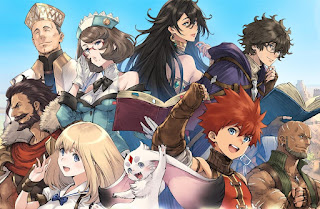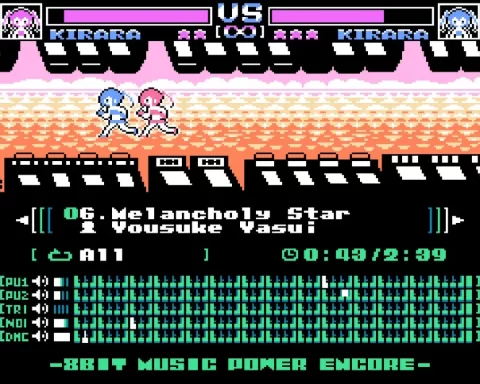Rideon Japan, the developer behind the quality mobile riff on Final Fantasy Tactics, the Mercenaries series, has a second focus; it also creates mobile riffs on the Atelier-style “item-creation” JRPG. Marenian Tavern Story, which came to us on Nintendo Switch two years ago courtesy of Kemco, is one example of this. Blacksmith of the Sand Kingdom is… well, it’s almost the exact same principle.
That’s not an inherently bad thing. As I noted in my review of Marenian Tavern Story: “It’s a silly plot, and it’s one that’s a little too earnest with the “hard work and a cheerful disposition is all you need to succeed” aspirational tone. Cheerful as the likes of Harvest Moon, Atelier and Marenian Tavern Story are, and though they’re not designed to think on too hard, the reality is that they do sell a way of thinking about work, success and happiness that is downright naive in the current social and economic environment. This isn’t a criticism of any of the games mentioned, since I love them all, but it’s just as well they’re so bright and cheerful and the video game equivalent to comfort food, because they’re not what you’d typically call insightful.”
Naive it might be, but Marenian really is cheerful and unendingly pleasant to play. Each character is a variation the various traditional, safe anime tropes, and Patty’s growing social circle soon fills with an eclectic mix of bright and perky personalities. Patty herself is a bit of a sweetheart, and the overall positive, generous, homey tone of the storytelling makes it simply impossible not to care about any of the characters. All that lets it down is a localisation that’s done on the cheap. There’s far too many literal translations from Japanese to English that result in phrasing and terminology that is odd and often takes the character completely out of their previously established character. Marenian Tavern Story isn’t broken, and the narrative is perfectly legible. It’s just that the script just needed a further run-through by a writer to help it read better and more consistently.

Aside from the name of the protagonist, and the fact that his job is that of a blacksmith rather than cook, Blacksmith of the Sand Kingdom is exactly the same thing. It’s equally overwhelmingly pleasant and positive in tone. The localisalisation is equally uninspired-but-legible, and the flow of the game is exactly the same thing. For some that will be an issue, perhaps, but two years between these kinds of games is a reasonable enough gap, and I certainly enjoyed my time running through Blacksmith of the Sand Kingdom.
To Rideon’s credit, the flow of the game is incredibly efficient. You’ll take on a variety of little quests (all of the “kill X enemies or find/collect/make Y items” variety), and then you’ll plunge into a range of dungeons to track down the right opponents to fight and resources to gather. Those dungeons are nice and small in scale, with each level having less than a dozen enemies prowling around and resource spots to gather things from. The stuff you need to gather comes in a plentiful stream, and so after a few minutes you’re ready to return back to town. There you turn the resources that you’ve gathered into a steadily expanding range of goods to sell, sell those goods, make money and complete quests. Then the next in-game day ticks over and you do it again.
Blacksmith of the Sand Kingdom gets a lot right. The gameplay loops are simple and enjoyable in their repetition. Nothing about the game is taxing, and it’s not overly interested in bogging you down in anything that will make you think. It’s frivolous, but in the context of cathartic mobile games (and, remember, this is a port of a mobile game, minus microtransactions), it’s also relaxing and enjoyable to play, and you’ll make good progress with any play session, no matter how short. It’s utterly inoffensive stuff, in other words, and there’s certainly a place for that in video games.
Of course, the streamlining means that it’s not as engaging as other games in the genre (most notably the Atelier series that it cribs ideas from). Making things is a simple matter of selecting items from a menu and then having a little pop-up say that you’ve created the thing. There’s none of those traits and other systems that you find in the Atelier series that make creation so engaging. So much of the joy in Atelier is finding all those high-quality ingredients and saving them to make really spectacular potions and bombs and things, and Blacksmith has none of that. Additionally, the combat is a rather joyless affair, with low-quality sprites, a limited range of animation, and none of the fun nonsense of Atelier to keep you interested through the grind. Thankfully those battles are over quickly, but it’s hard to get over the superficiality with that one particular element, when there are so many spectacular combat systems in the many JRPGs already available on the Nintendo Switch.
Blacksmith of the Sand Kingdom isn’t going to turn heads or win awards, and it’s not quite to the same standard of refinement as Rideon’s tactics JRPGs tend to be. With that being said, it offers an enjoyable, pleasant and pleasing way of spending time in-between meatier fare, and the efficient and bubbly approach makes it very easy to pick up and play. Kemco has a habit of working with some really terrible developers, but between this and Marenian Tavern Story Kemco has found a partner that can produce the kind of cut-price JRPGs that it likes to publish while maintaining a standard that means they’re still worth playing.









